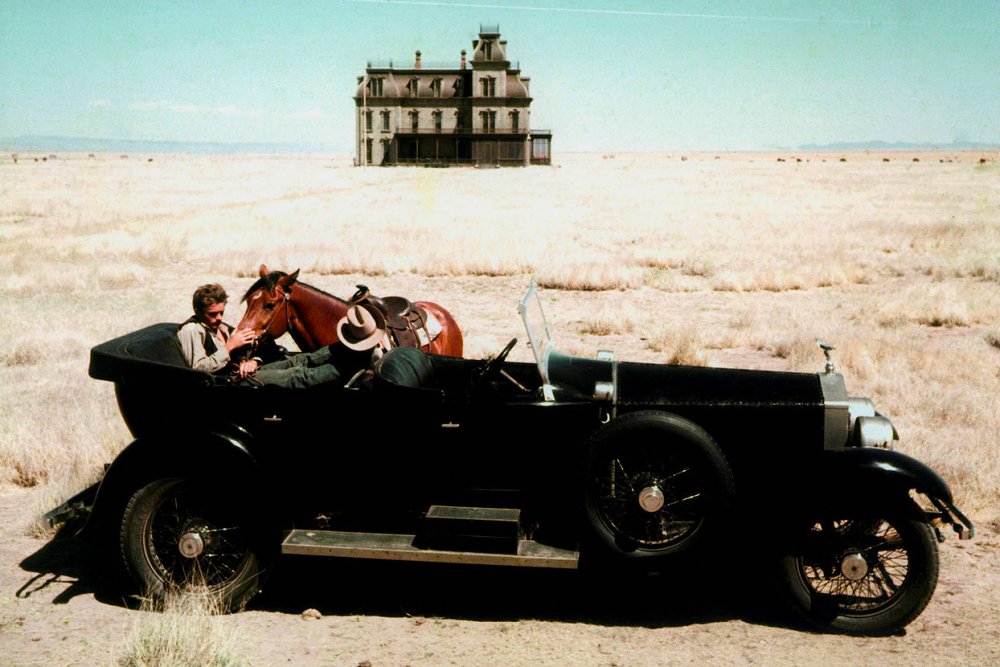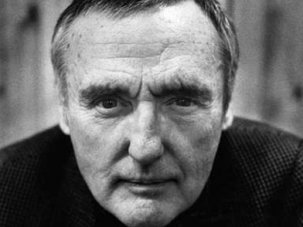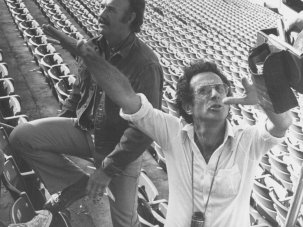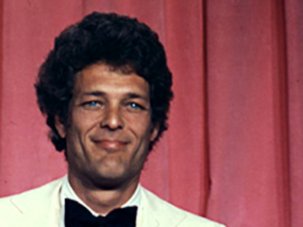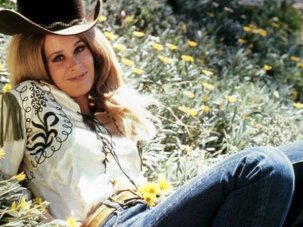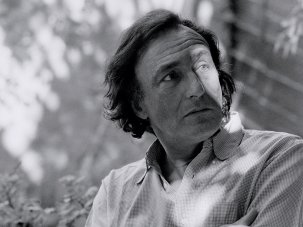If you want to locate the origins of New Hollywood, travel with me to 1956.
No, I am not thinking of Douglas Sirk’s Written on the Wind or Alfred Hitchcock’s The Man Who Knew Too Much or Raoul Walsh’s The Revolt of Mamie Stover. As great as those films are – and they are among my own favourites to be released in 1956 – they belong decisively to their own era; they are unimaginable in any other.
The film I have in mind is George Stevens’ Giant, which celebrates its 60th anniversary this year and which is ambitious, daring and weird in ways that do not call to mind the mid-50s. Based on a 1952 novel by Edna Ferber, the film recounts the life and times of a Texas cattle ranch tycoon (Rock Hudson) and his wife (Elizabeth Taylor), but in so doing, it looks ahead to the auteur epoch of the 1970s.
Its genuinely enormous canvas anticipates such ungainly epics as Robert Altman’s Nashville (1975), Michael Cimino’s Heaven’s Gate (1980) and Terrence Malick’s Days of Heaven (1978). In fact, more than one critic has observed that the mansion in which Hudson and Taylor live in Giant directly influenced the mansion in which Sam Shepard and Brooke Adams live in Days of Heaven, but the overlaps between the films are deeper than that. Both use the Texas plains as the counterintuitive setting for what is essentially a domestic drama, and both favour visual expression – sometimes subtle, often florid – over dialogue.
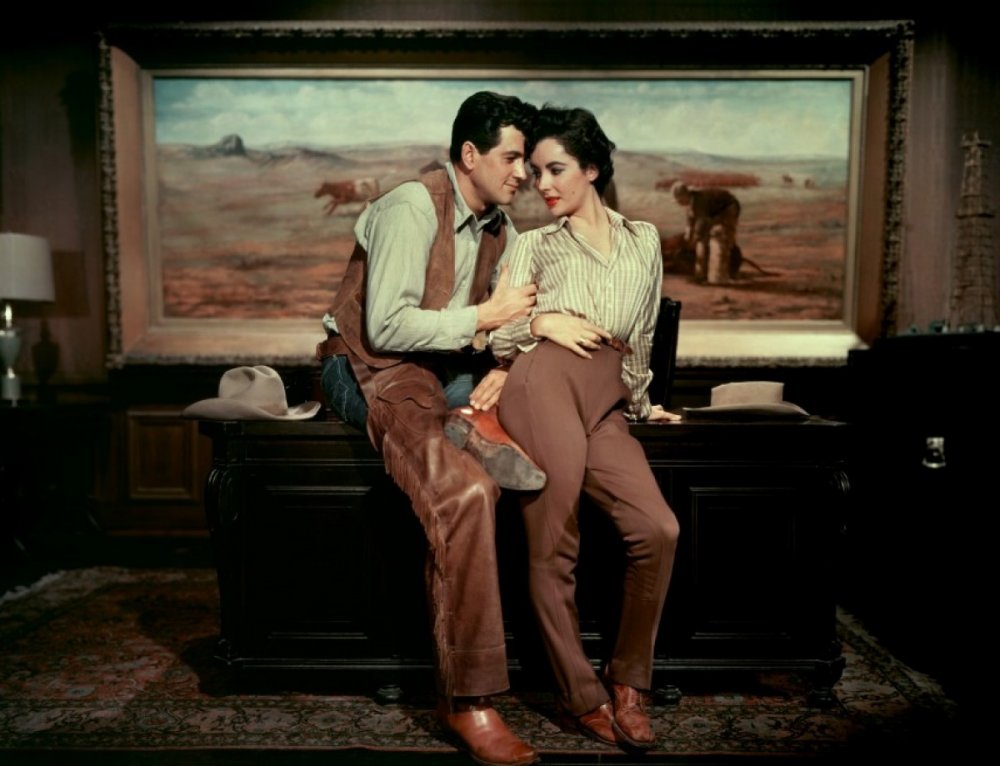
Rock Hudson and Elizabeth Taylor in Giant (1956)
As the nearly three-and-a-half-hour film begins, however, Stevens places his hero – Jordan “Bick” Benedict (played by a strong, sullen Hudson) – far outside of his natural environment. Bick – resembling nothing so much as a bull who has wandered off the range – is seen journeying by train from his rough-and-tumble home state to bucolic rural Maryland with the aim of acquiring a horse from a well-heeled family, the Lynntons. As it turns out, the distance between the places is measured in manners as well as miles.
While visiting the Lynntons’ gracious estate, Bick is treated with cordial condescension. At dinner, patriarch Horace Lynnton (Paul Fix) looks on placidly as his wife, Nancy (Judith Evelyn), mistakes Texas for Nevada. Meanwhile, their future son-in-law, David (a tweedy Rod Taylor), has his states straight, but admits to knowing little of Texas apart from its dimensions. “Of course, from an Englishman’s point of view,” David says, “the mere size of it takes your breath away.”
Sensing that he is a stranger in a strange land, Bick does not boast about the state for which he surely bursts with pride. In fact, when David prods him to disclose his own ranch’s size, Bick demurs. “Oh, it’s one of the biggest,” Bick says vaguely, but the family is determined to wring details from their houseguest. David tosses out educated guesses: Is Bick’s ranch 20,000 acres? 50,000? His hand forced, Bick finally furnishes a figure: 595,000 acres.
“I’d call that quite a parcel,” Horace says, but in truth, neither he nor his kith and kin can comprehend such size. One of the Lynntons’ daughters, Leslie (Taylor), sets her sights on Bick almost instantly and is willing to pull up stakes for Texas in order to become his wife. Yet even she has to read up on the state: on the night of their first encounter, Leslie stays up late to pour over fat tomes detailing its history. To these members of polite society, then, Texas is akin to the undiscovered country referred to in Shakespeare.
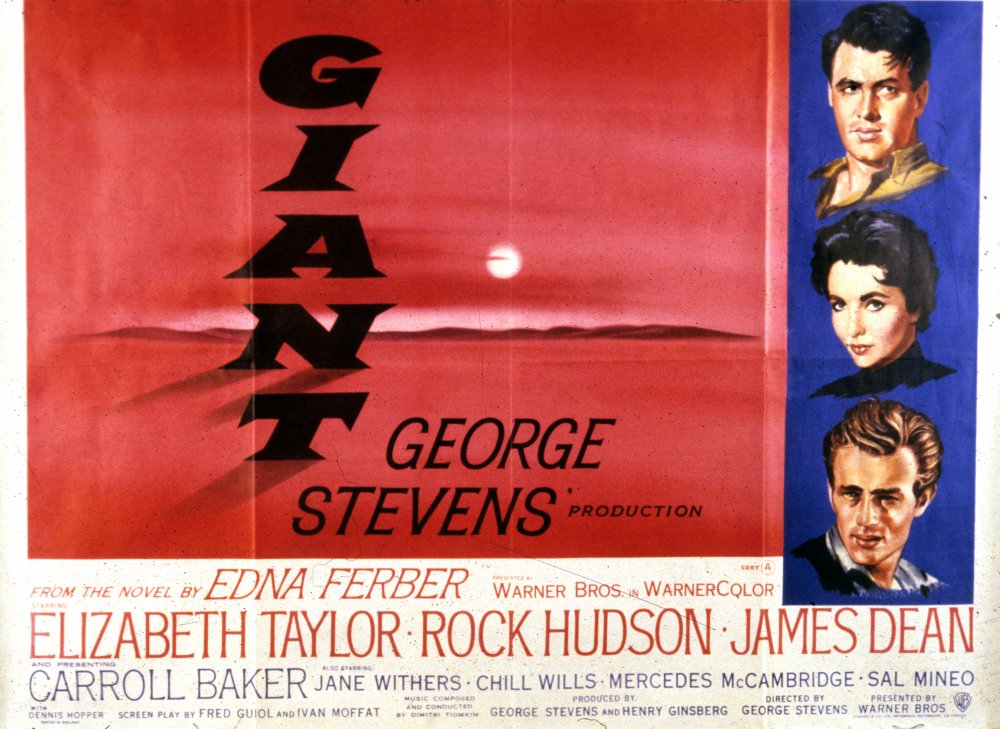
Fortunately, George Stevens was not beset with any such bewilderment. In making Giant, the director revealed himself to have an intuitive grasp of Texas and its most salient features: Its searing temperatures, its recalcitrant citizens and, above all, its almost unfathomable horizons. The last quality seems to have suggested the shape of the film itself – as though Stevens felt that a 90-minute film would have been unworthy of a place so vast. The point is hard to argue: it is tough to envisage a film of almost three-and-a-half hours set in, say, Delaware or Rhode Island.
Even the title cards reflect Stevens’ mania for gigantism: the huge slanted letters spelling GIANT resemble those seen at the start of Richard Donner’s Superman (1978) – a happy coincidence since, according to Daniel Eagan’s book America’s Film Legacy: The Authoritative Guide to the Landmark Movies in the National Film Registry, Giant held the position as Warner Bros.’ biggest success up to the release of the superhero extravaganza.
A decade before tackling Giant, Stevens had famously altered the course of his career, forsaking the mild comedies he had specialised in – including Swing Time (1936), Woman of the Year (1942) and The More the Merrier (1943), all delightful – for more serious, solemn scripts. Even so, there is nothing in the ensuing batch of dramas to suggest the scale of Giant. To be sure, I Remember Mama (1948) and A Place in the Sun (1951) are important films, but epics they are not. Giant, then, is sui generis. Its staggering size not only does justice to Texas but also provides room for subplots and detours; the film is simply loaded with incident. “When you do this,” Stevens said in a 1973 interview at the American Film Institute, “the essential thing is to make sure you’re telling a story.” Beyond detailing the eventual marriage of Bick and Leslie, the film follows the progress of their children – played as adults by Dennis Hopper, Carroll Baker and Fran Bennett – as well as the providence-filled saga of Jett Rink (James Dean), a ranch hand in the employ of Bick who has an unlikely second act as an oil magnate.
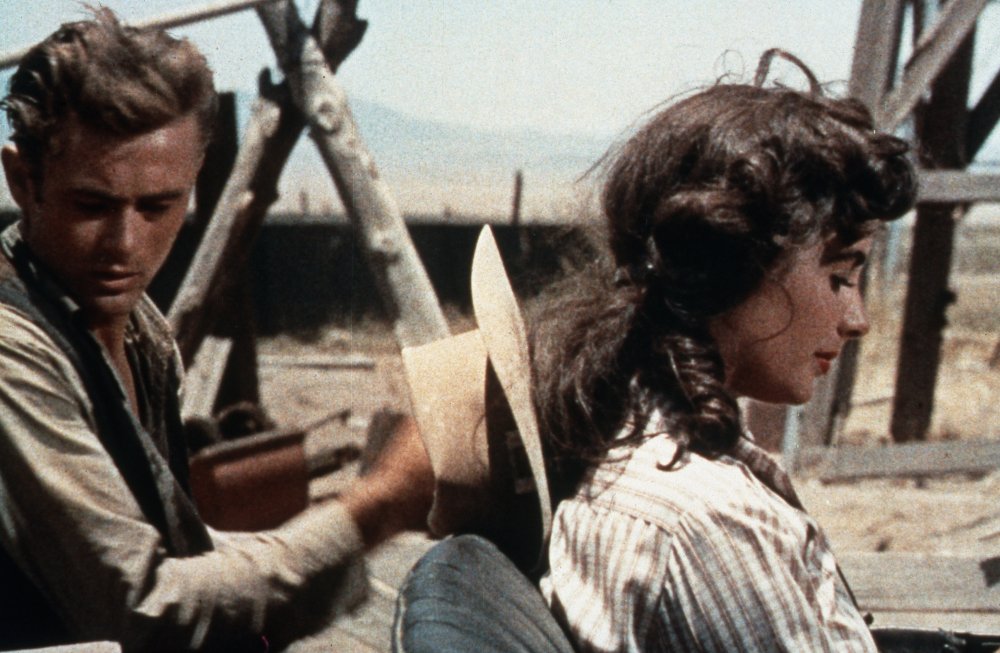
James Dean and Elizabeth Taylor in Giant (1956)
The length of Giant also allows for the inclusion of odd touches likely to have been omitted in a tighter cut. Mere minutes into the film, Stevens introduces a curious technique which is deployed throughout the film: the director uses dissolves within single scenes. As Bick waits for Horace at the train station in Maryland, the camera is initially positioned low to the ground and moves in on the Texan’s boots. Then, unaccountably, Stevens dissolves from this shot to a wider angle of Bick in the same position; because no appreciable time has passed, it’s the cinematic equivalent of turning the page in a book mid-paragraph.
Here, at least, there is some precedent. In an equally mystifying moment in Stevens’ western Shane (1953), Jack Palance swings open the doors to a saloon, but before he can walk in, the film skips ahead; Stevens dissolves to a shot of Palance moving past the camera. This choice utterly flummoxed one of the film’s biggest fans, Woody Allen. “It’s one of the most puzzling dissolves I’ve ever seen,” Allen said in a 2001 interview about the film in the New York Times. “I can’t imagine what it was for. It must have been to cover up a mistake.” Or – on the basis of the use of the same technique in Giant – not.
Like his successors Altman, Cimino and Malick, Stevens uses his film’s length indulgently – pausing for passages of pure poetry. For example, at the end of his stay in Maryland, Bick follows Leslie to a white picket fence – soon joined by the horse Bick now owns. Bick and Leslie gaze at each other without speaking. Then, in a thrilling moment, Leslie turns her head from Bick while the camera pans past her and tilts up to the canopy of a tree; here, one could argue, is the unlikely source of Altman’s wandering camera. The drama of the pan is pleasing in itself, but it also implies that something significant is about to transpire – and indeed it does. In the next scene, Bick and Leslie are revealed to be newlyweds as they share a compartment on a train headed to Texas.
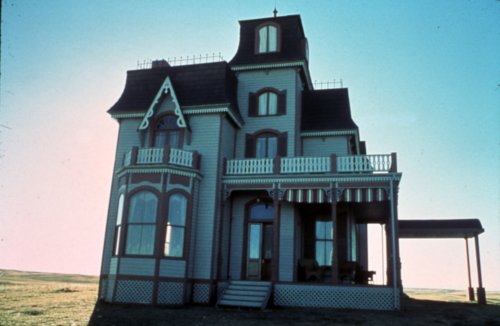
The remote mansion in Days of Heaven (1978)
Bick and Leslie take up residence in the Days of Heaven-like mansion which sits on Bick’s ranch – the sight of which former Chicago Reader critic Dave Kehr (not a fan of the film) called “one of the most memorable graphic images of the 50s.” Stevens is quick to establish the role of Jett Rink, who looks on with nosiness as Bick and Leslie drive up to the house for the first time as a couple. Strikingly, when Bick carries Leslie over the threshold, the action is framed from Jett’s perspective. At first glance, it seems perplexing that such an intimate moment between the two would be photographed from the perspective of a third party (Jett’s back is to the camera to indicate his point of view), but soon Stevens’ intentions become clear. The shot is like a promise to the audience: Jett is no mere bystander but a major figure in the drama yet to unfold. Stevens tosses many balls into the air; few fall to the ground.
No secondary character leaves a bigger impression than Bick’s live-in sister, Luz (Mercedes McCambridge, whose unsmiling countenance and growl of a voice suggest that she was already warming up for The Exorcist). A force of nature who tends to both the ranch and the house, Luz is about as welcoming to Leslie as Dame Judith Anderson is to Joan Fontaine in Alfred Hitchcock’s Rebecca (1940) – which is to say, not very.
In fact, Luz gives what is otherwise a straightforward, realistic film a mystical aura, as when she repeatedly seems to foretell her brother’s wife’s demise. At a picnic gathering, Leslie is the only one among the guests to be affected by the awful heat, leading Luz to double down: “You call this hot? Wait till July.” Finally, the sight of a calf’s head being prepared for consumption – and the accompanying call of “Eat it while it’s hot!” – makes Leslie swoon. In a wide shot, Luz stands motionless – her head cocked, her hands on her hips in a pose of contempt – as Bick carries Leslie away. Then, Stevens does something shocking: he abruptly cuts to a close dolly-in on Luz, who says in a low tone, “That’s what I was afraid of.” The edit, however, is dramatically justifiable since Luz is essentially muttering to herself and would therefore be inaudible unless the camera moved in close.
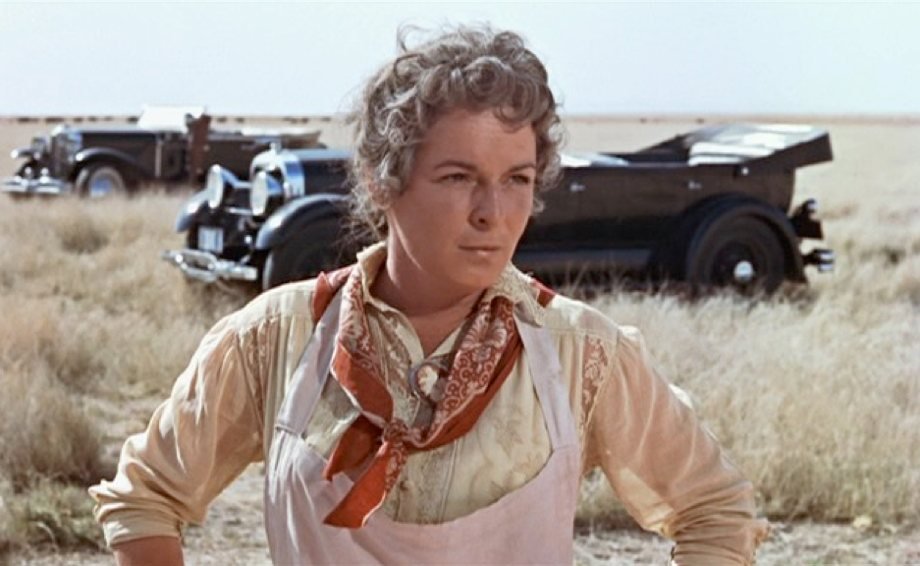
Mercedes McCambridge in Giant
A similar moment occurs one scene later when Leslie – fortified after a rest – insists on riding her old horse over the objections of Luz. As Bick and Leslie ride off, Luz continues to yap from a cavernous front porch. “Bick, I’d see she rides a more gentle animal if I was you,” Luz, playing soothsayer, says to no one in particular. “She’s going to fall off and break her neck.” In fact, Luz’s powers of divination are confirmed when she takes a turn on the horse. Stevens again cuts from far to near: wide angles of Luz atop the bucking horse are intercut with an insert-like close-up of Luz’s spurs as they jab the horse. “I wanted to go from the extreme long shot to the spur going right into the horse’s flank, which – if you had sympathy for the woman – gave validity for the horse bucking like that,” Stevens said at the AFI. “In two cuts there’s a story: how we contribute to our own undoing.” The quiet, flickering long shots are a particularly painterly example of the work of cameraman William C. Mellor.
As Stevens suggests, Luz perishes after being heaved from the horse. We miss her character – her cussedness, like that of Jo Van Fleet in Elia Kazan’s Wild River (1960), is appealing – but at least she has the good fortune to go quickly. Not so for Bick, who seems fated to suffer a long, painful death of a different sort. His kingdom – huge as it is – is starting to crumble: Jett is remembered in Luz’s will with a bit of land on which oil is found; Leslie takes a break from married life and temporarily flees to Maryland; and, while the marriage survives, the kids are far from all right. As an adult, Jordy (Dennis Hopper) will have nothing to do with ranching; in a choice meant as a rebuke to his rough pop, he seeks a career as a physician. In static shots that seem borrowed from one of Stevens’ comedies, Bick and Leslie bicker over their boy’s direction while occupying twin beds. And, in the clearest indicator of an evolving Texas, Jordy decides to marry a Mexican-American woman, Juana (Elsa Cardenas), with whom he has a son.
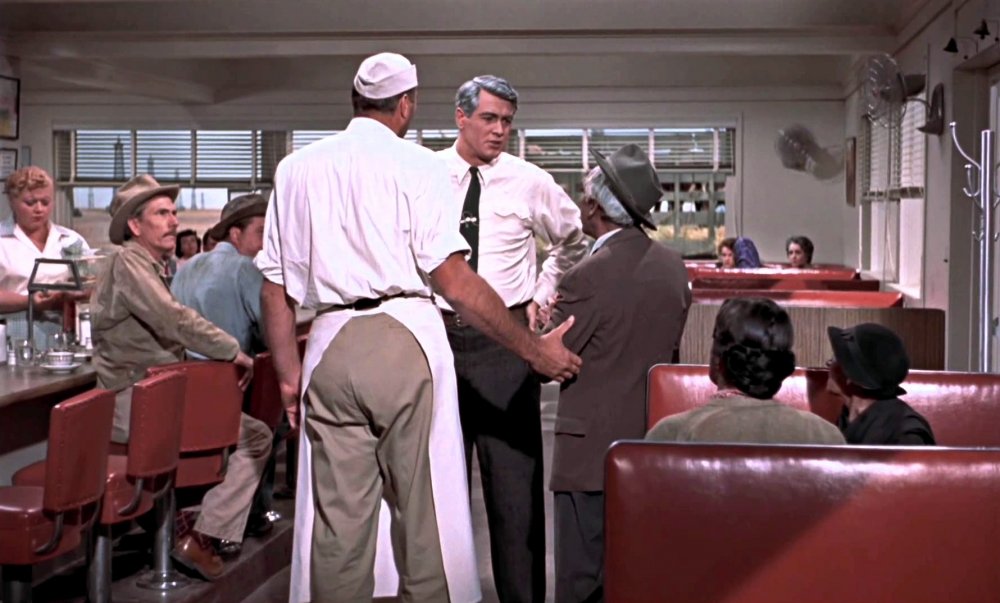
Yet, in the craziest episode in the film, Bick manages to reconcile his own conservative impulses – which Stevens in no way mocks – with his family’s increasingly diverse, cosmopolitan qualities. In the next-to-last scene, Bick and Leslie – joined by Juana and her son – sit down for a bite to eat at a diner known as Sarge’s Place. When the eponymous Sarge gives Bick’s interracial extended family a hard time and later tries to usher out a Mexican family in an adjacent booth, Bick objects and initiates a fight. In a touch that feels at least a decade ahead of its time, The Yellow Rose of Texas – accidentally cued when Bick tosses Sarge in the direction of a jukebox – provides musical accompaniment to the tussle. This chaotic, cartoony scene resembles the faux fights in the 1960s Batman television series – Wham! Pow! – but that does not diminish its moral clarity. Bick may be a brute, but he is a brute who is willing to wallop bad guys like Sarge – not unlike, say, John Wayne in The Man Who Shot Liberty Valance (1962).
This scene is the grandest gamble of Giant – it is not only unlike anything else made in 1956, but its spirit is bold even in 2016. In deciding to fight – to literally fight – against prejudice, Bick Benedict ends up in a different, more enlightened place than where he began. The film, too, takes its own long and winding road. What began as a western – teeming with cattle and horses and oil wells – concludes with a pop-art fistfight.
Giant is that rare film whose anniversary reminds us not of how old it is but how fresh and relevant it continues to be.
-
The Digital Edition and Archive quick link
Log in here to your digital edition and archive subscription, take a look at the packages on offer and buy a subscription.




